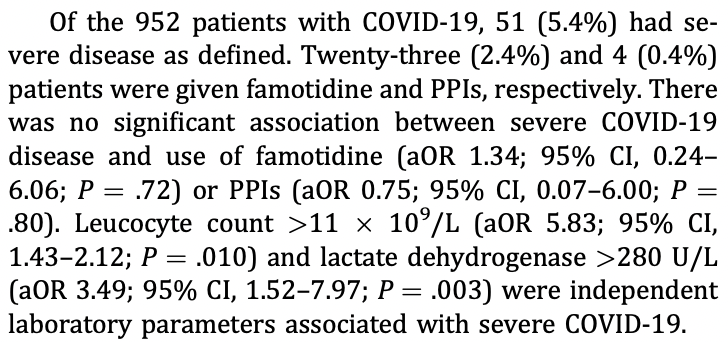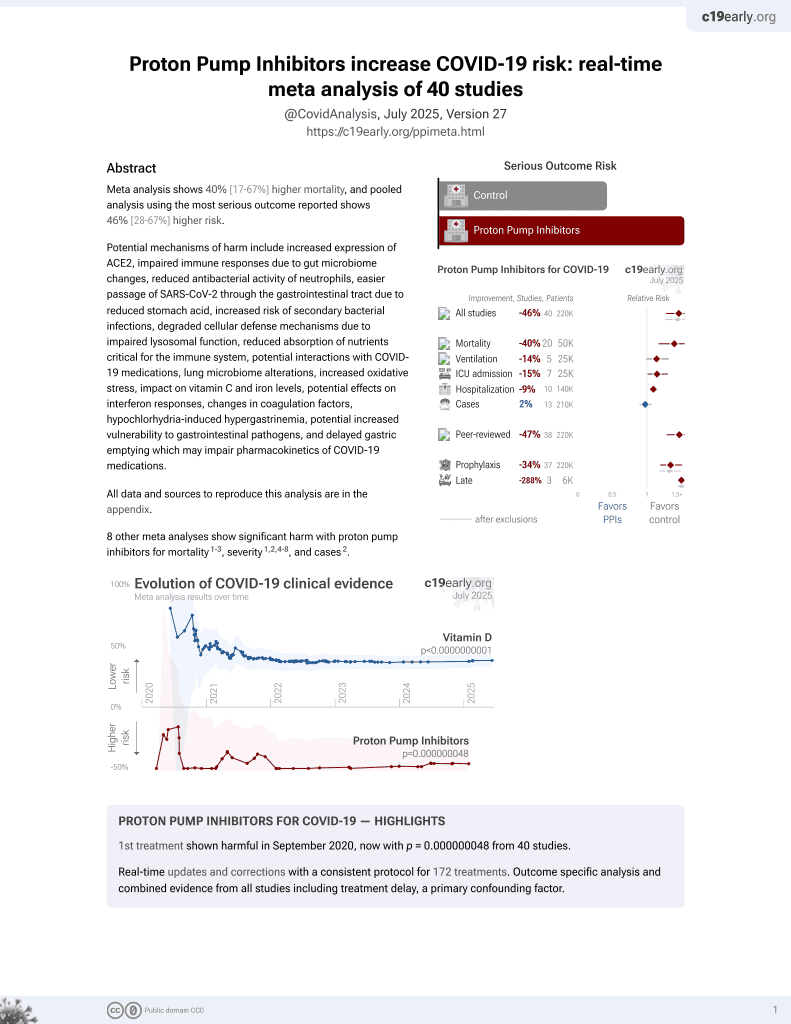
Association Between Famotidine Use and COVID-19 Severity in Hong Kong: A Territory-wide Study
et al., Gastroenterology, doi:10.1053/j.gastro.2020.05.098, Apr 2021
PPIs for COVID-19
1st treatment shown to increase risk in
September 2020, now with p = 0.000000048 from 40 studies.
6,400+ studies for
210+ treatments. c19early.org
|
Retrospective 952 COVID-19 patients in Hong Kong, showing no significant difference in severe disease with famotidine use or PPI use.
Standard of Care (SOC) for COVID-19 in the study country,
China, is average with moderate efficacy for approved treatments1.
Study covers famotidine and proton pump inhibitors.
|
risk of severe case, 25.0% lower, OR 0.75, p = 0.80, treatment 4, control 948, adjusted per study, multivariable, RR approximated with OR.
|
| Effect extraction follows pre-specified rules prioritizing more serious outcomes. Submit updates |
Cheung et al., 30 Apr 2021, retrospective, China, peer-reviewed, 3 authors.
Reply
Gastroenterology, doi:10.1053/j.gastro.2021.01.017
The pooled prevalence of digestive symptoms was 12%-15%, 9,10 with nausea or vomiting, diarrhea, and loss of appetite being the 3 most common symptoms. The geographical disparities also exist for the prevalence of GI symptoms and liver injury as reported by the American Gastroenterological Association Institute publication that digestive involvement was more prevalent outside China. 5, 11 As for the association between GI involvement and the severity of COVID-19, according to our meta-analysis, 9 patients with GI involvement tended to have a poorer disease course. Our preliminary finding has been confirmed by subsequent studies. 12, 13 This might be ascribed to the fact that even after the virus has been cleared from the respiratory system, it can persist in the gut of some patients for several days ( 47 days), which leads to a high level of virus and longer lasting disease. 9 In conclusion, current evidence supports continued use of ACEI/ARBs in COVID-19 patients with hypertension. As an important clinical feature in patients with COVID-19, digestive symptoms should be treated with caution in the early stage of COVID-19, and dynamic monitoring of liver function is imperative during clinical practice to reduce the complications and mortality of COVID-19.
Conflicts of interest The authors disclose no conflicts. This letter is in reference to the study by Freedberg et al 1 recently published in Gastroenterology. This retrospective analysis of an inpatient cohort admitted to 2 hospitals in New York found that patients with coronavirus disease 2019 (COVID-19) who were treated with famotidine exhibited a lower risk of death or mechanical ventilation as composite outcomes over a 30-day period. The study was based on computational modelling, which proposed famotidine might inhibit viral replication through direct interaction with the 3-chymotrypsin-like protease, 2 and was also preceded by a small, short-term follow-up, outpatient study suggesting that famotidine use was associated with symptomatic improvement. 3 However, the current study published in Gastroenterology provides additional value because the previous cohort was much smaller in number, included patients without a proven COVID-19 diagnosis, and lacked a control group. The current study by Freedberg et al 1 brings a few questions to mind, which we hope the authors can answer. In the conclusions, the authors stated, "The study was premised on the assumption that use of famotidine represented a continuation of home use." In the Results section, they also say, "Home use of famotidine was documented on admission medication reconciliation in 15% of those who used famotidine while hospitalized." These points bring up a few questions.
Does this..
References
Alhazzani, None, Intensive Care Med
Baral, None, Curr Atheroscler Rep
Cannata, None, Eur Heart J Cardiovasc Pharmacother
Chan, None, Hypertension
Cheung, None, World J Gastroenterol
Freedberg, None, Gastroenterology
Kumar, None, BMJ Open Gastroenterol
Mao, None, Lancet Gastroenterol Hepatol
Mehra, None, N Engl J Med
Mehra, None, N Engl J Med
Parasa, None, JAMA Netw Open
Parigi, None, Gastroenterology
Patoulias, None, Curr Hypertens Rep
Sultan, None, Gastroenterology
Tsibouris, None, Ann Gastroenterol
Vaduganathan, None, N Engl J Med
Wu, None, Acta Pharm Sin B
Zhang, None, Pharmacol Res
Zhang, None, Pharmacol Res
DOI record:
{
"DOI": "10.1053/j.gastro.2020.05.098",
"ISSN": [
"0016-5085"
],
"URL": "http://dx.doi.org/10.1053/j.gastro.2020.05.098",
"alternative-id": [
"S0016508520349404"
],
"assertion": [
{
"label": "This article is maintained by",
"name": "publisher",
"value": "Elsevier"
},
{
"label": "Article Title",
"name": "articletitle",
"value": "Association Between Famotidine Use and COVID-19 Severity in Hong Kong: A Territory-wide Study"
},
{
"label": "Journal Title",
"name": "journaltitle",
"value": "Gastroenterology"
},
{
"label": "CrossRef DOI link to publisher maintained version",
"name": "articlelink",
"value": "https://doi.org/10.1053/j.gastro.2020.05.098"
},
{
"label": "CrossRef DOI link to the associated document",
"name": "associatedlink",
"value": "https://doi.org/10.1053/j.gastro.2020.05.053"
},
{
"label": "Content Type",
"name": "content_type",
"value": "simple-article"
},
{
"label": "Copyright",
"name": "copyright",
"value": "© 2021 by the AGA Institute"
}
],
"author": [
{
"affiliation": [],
"family": "Cheung",
"given": "Ka Shing",
"sequence": "first"
},
{
"affiliation": [],
"family": "Hung",
"given": "Ivan F.N.",
"sequence": "additional"
},
{
"ORCID": "http://orcid.org/0000-0002-5993-1059",
"affiliation": [],
"authenticated-orcid": false,
"family": "Leung",
"given": "Wai K.",
"sequence": "additional"
}
],
"container-title": [
"Gastroenterology"
],
"content-domain": {
"crossmark-restriction": true,
"domain": [
"clinicalkey.jp",
"clinicalkey.com",
"gastrojournal.org",
"clinicalkey.es",
"clinicalkey.com.au",
"clinicalkey.fr",
"elsevier.com",
"sciencedirect.com"
]
},
"created": {
"date-parts": [
[
2020,
7,
16
]
],
"date-time": "2020-07-16T15:44:10Z",
"timestamp": 1594914250000
},
"deposited": {
"date-parts": [
[
2021,
6,
30
]
],
"date-time": "2021-06-30T03:55:25Z",
"timestamp": 1625025325000
},
"indexed": {
"date-parts": [
[
2021,
12,
23
]
],
"date-time": "2021-12-23T22:25:12Z",
"timestamp": 1640298312214
},
"is-referenced-by-count": 16,
"issn-type": [
{
"type": "print",
"value": "0016-5085"
}
],
"issue": "5",
"issued": {
"date-parts": [
[
2021,
4
]
]
},
"journal-issue": {
"issue": "5",
"published-print": {
"date-parts": [
[
2021,
4
]
]
}
},
"language": "en",
"license": [
{
"URL": "https://www.elsevier.com/tdm/userlicense/1.0/",
"content-version": "tdm",
"delay-in-days": 0,
"start": {
"date-parts": [
[
2021,
4,
1
]
],
"date-time": "2021-04-01T00:00:00Z",
"timestamp": 1617235200000
}
}
],
"link": [
{
"URL": "https://api.elsevier.com/content/article/PII:S0016508520349404?httpAccept=text/xml",
"content-type": "text/xml",
"content-version": "vor",
"intended-application": "text-mining"
},
{
"URL": "https://api.elsevier.com/content/article/PII:S0016508520349404?httpAccept=text/plain",
"content-type": "text/plain",
"content-version": "vor",
"intended-application": "text-mining"
}
],
"member": "78",
"original-title": [],
"page": "1898-1899",
"prefix": "10.1053",
"published": {
"date-parts": [
[
2021,
4
]
]
},
"published-print": {
"date-parts": [
[
2021,
4
]
]
},
"publisher": "Elsevier BV",
"reference": [
{
"DOI": "10.1053/j.gastro.2020.05.053",
"author": "Freedberg",
"doi-asserted-by": "crossref",
"first-page": "1129",
"journal-title": "Gastroenterology",
"key": "10.1053/j.gastro.2020.05.098_bib1",
"volume": "159",
"year": "2020"
},
{
"DOI": "10.1016/j.apsb.2020.02.008",
"author": "Wu",
"doi-asserted-by": "crossref",
"first-page": "766",
"journal-title": "Acta Pharm Sin B",
"key": "10.1053/j.gastro.2020.05.098_bib2",
"volume": "10",
"year": "2020"
},
{
"DOI": "10.1016/j.phrs.2020.104927",
"author": "Zhang",
"doi-asserted-by": "crossref",
"first-page": "104927",
"journal-title": "Pharmacol Res",
"key": "10.1053/j.gastro.2020.05.098_bib3",
"volume": "158",
"year": "2020"
},
{
"DOI": "10.1056/NEJMoa2007621",
"author": "Mehra",
"doi-asserted-by": "crossref",
"first-page": "e102",
"journal-title": "N Engl J Med",
"key": "10.1053/j.gastro.2020.05.098_bib4",
"volume": "382",
"year": "2020"
},
{
"DOI": "10.3748/wjg.v25.i24.2990",
"author": "Cheung",
"doi-asserted-by": "crossref",
"first-page": "2990",
"journal-title": "World J Gastroenterol",
"key": "10.1053/j.gastro.2020.05.098_bib5",
"volume": "25",
"year": "2019"
},
{
"DOI": "10.1007/s00134-017-5005-8",
"author": "Alhazzani",
"doi-asserted-by": "crossref",
"first-page": "1",
"journal-title": "Intensive Care Med",
"key": "10.1053/j.gastro.2020.05.098_bib6",
"volume": "44",
"year": "2018"
}
],
"reference-count": 6,
"references-count": 6,
"relation": {},
"score": 1,
"short-container-title": [
"Gastroenterology"
],
"short-title": [],
"source": "Crossref",
"subject": [
"Gastroenterology",
"Hepatology"
],
"subtitle": [],
"title": [
"Association Between Famotidine Use and COVID-19 Severity in Hong Kong: A Territory-wide Study"
],
"type": "journal-article",
"update-policy": "http://dx.doi.org/10.1016/elsevier_cm_policy",
"volume": "160"
}
cheung
